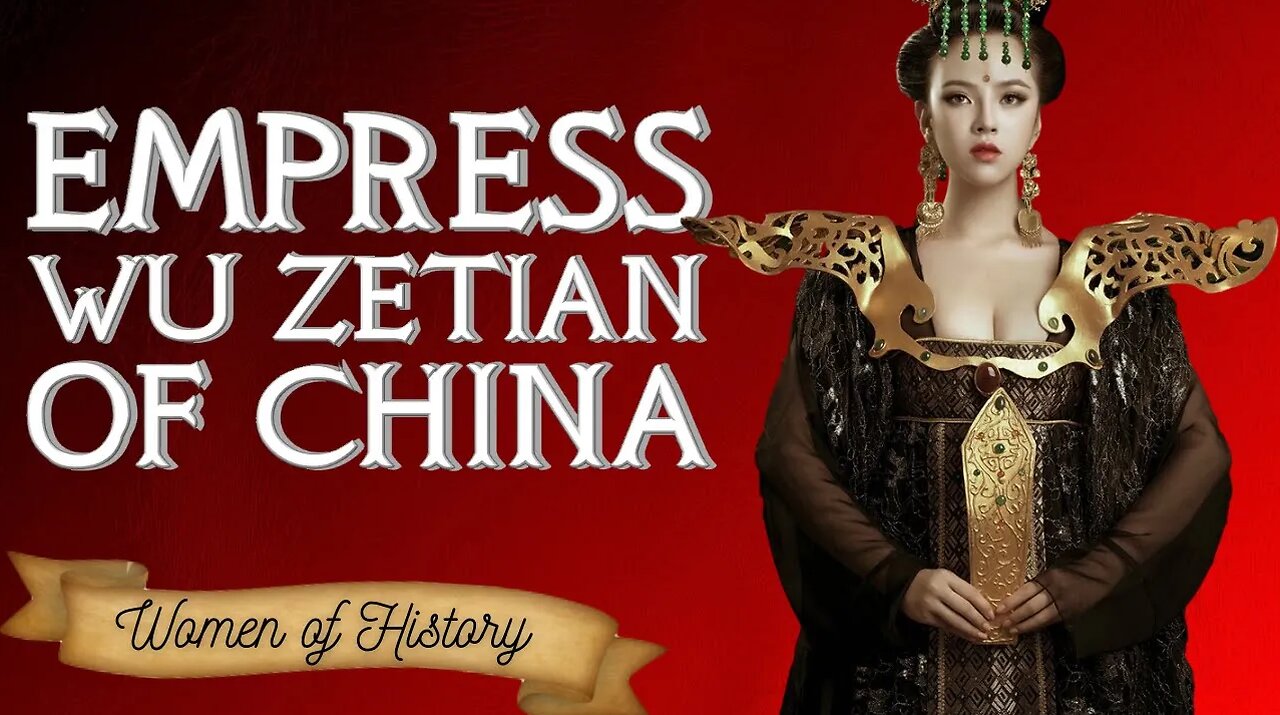Premium Only Content

Empress Wu Zetian - The Only Female Monarch in the History of China
Wu Zhao, commonly known as Wu Zetian (17 February 624[note 8][note 9] – 16 December 705), alternatively Wu Hou, and during the later Tang dynasty as Tian Hou, was the de facto ruler of China, first through her husband the Emperor Gaozong and then through her sons the Emperors Zhongzong and Ruizong, from 665 to 690. She subsequently became empress regnant of the Zhou dynasty (周) of China, ruling from 690 to 705. She is notable for being the only female monarch in the history of China.
Wu was the concubine of Emperor Taizong. After his death, she married his successor—his ninth son, Emperor Gaozong, officially becoming Gaozong's huanghou (皇后, empress consort, title for the reigning emperor's main consort) in 655, although having considerable political power prior to this. After Gaozong's debilitating stroke in 660, Wu Zetian became administrator of the court, a position equal to the emperor's until 705.
After her wedding to Emperor Gaozong in 655, Empress Wu's rise to power was swift. A strong, charismatic, and well-educated woman who enjoyed the absolute interest of her husband, Empress Wu was the most powerful and influential woman at court during a period when the Tang Empire was at the peak of its power and glory. She was more decisive and proactive than her husband, and she is considered by historians to have been the real power behind the throne and ruling figure for more than eighteen years. She was often present when the Emperor held court, and even held court independently when the Emperor was unwell. She was given charge of his Imperial Seal, implying that her perusal and consent were necessary before any document or order received legal validity. The Emperor Gaozong sought her views on all matters before issuing orders. Empress Wu was granted certain honors and privileges which were not enjoyed by any Chinese empresses before or after. After Gaozong's death, Empress Wu as Empress dowager and regent conquered power independently and uniquely, and seven years later, she seized the throne in the Zhou dynasty, becoming the only empress regnant in Chinese history. Because she ruled from 665 to 690 through her husband and sons, she was thus one of the longest-reigning de facto rulers in the history of the world. She also spent one of the brightest periods of history in China as emperor.
The importance to history of Wu Zetian's period of political and military leadership includes the major expansion of the Chinese empire, extending it far beyond its previous territorial limits, deep into Central Asia, and engaging in a series of wars on the Korean Peninsula, first allying with Silla against Goguryeo, and then against Silla over the occupation of former Goguryeo territory. Within China, besides the more direct consequences of her struggle to gain and maintain supreme power, Wu's leadership resulted in important effects regarding social class in Chinese society and in relation to state support for Taoism, Buddhism, education, and literature. Wu Zetian also had a monumental impact upon the statuary of the Longmen Grottoes and the "Wordless Stele" at the Qianling Mausoleum, as well as the construction of some major buildings and bronze castings that no longer survive.
Besides her career as a political leader, Wu Zetian also had an active family life. Although family relationships sometimes became problematic, Wu Zetian was the mother of four sons, three of whom also carried the title of emperor, although one held that title only as a posthumous honor. One of her grandsons became the renowned Emperor Xuanzong of Tang.
#WomenofHistory #HistoricalWomen #FamousFemales
-
 10:23
10:23
Parry This
11 months agoMarie "Madame" Curie - First Woman to Ever Win A Nobel Prize
71 -
 1:01:07
1:01:07
In The Litter Box w/ Jewels & Catturd
23 hours agoVOX POPULI, VOX DEI | In the Litter Box w/ Jewels & Catturd – Ep. 709 – 12/19/2024
49K26 -
 22:54
22:54
Stephen Gardner
4 hours ago🔥JUST NOW: Trump JUST SHOCKED GOP with new DEMAND!!
34.1K30 -
 1:23:22
1:23:22
Tate Speech by Andrew Tate
5 hours agoEMERGENCY MEETING EPISODE 96 - LAWFARE BREAKDOWN
156K117 -
 16:53
16:53
DeVory Darkins
23 hours ago $12.95 earnedElon Musk Drops NIGHTMARE WARNING on Congress
35.1K206 -
 1:29:17
1:29:17
Mally_Mouse
4 hours agoLet's Play!! - Stardew Valley
23.5K1 -
 8:56
8:56
Melonie Mac
3 hours agoMy Superman Trailer Impressions
18.7K25 -
 LIVE
LIVE
StoneMountain64
5 hours ago☠️
198 watching -
 36:08
36:08
Standpoint with Gabe Groisman
5 hours agoEp. 62. Understanding the Chaos in Syria. Dr. Jonathan Schanzer
29.4K4 -
 3:52:39
3:52:39
Viss
5 hours ago🔴LIVE - Budget Zero To Hero Runs! - Delta Force
28.5K2